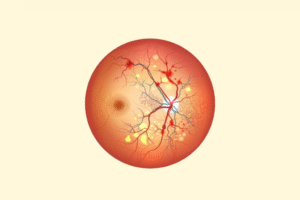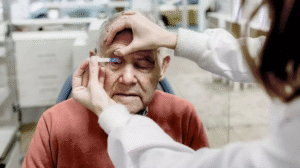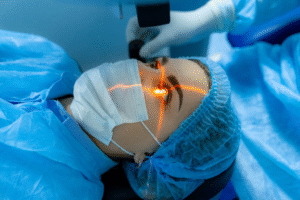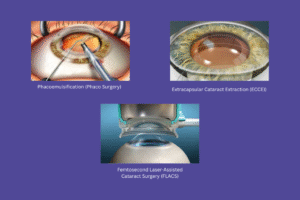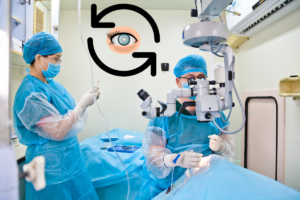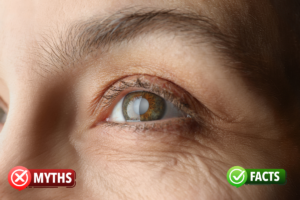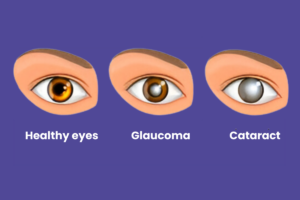Is cataract surgery painful? Addressing common concerns

Cataract surgery is one of the most common and safe eye surgeries performed today, but many patients still have concerns about the potential pain and discomfort associated with the procedure. If you’re considering cataract surgery, understanding what to expect can help ease your worries. This blog will address the common concerns surrounding pain and offer a detailed guide on what you can expect before, during, and after the surgery.
Table of Contents
ToggleWhat is cataract surgery?
Cataract surgery is a procedure to remove the cloudy lens (cataract) from your eye and replace it with a clear artificial lens (intraocular lens or IOL). The cloudy lens forms naturally over time, usually due to aging, and affects your vision. If left untreated, cataracts can lead to blindness. The surgery is typically quick and highly effective, restoring clear vision for most patients.
Types of anesthesia used
To make the surgery pain-free, doctors typically use:
- Eye drops (Topical anesthesia): Most common, painless, and eliminates the need for injections.
- Local anesthesia (Injection): Used for patients who need extra numbing.
- Sedation (IV or Oral): Helps anxious patients feel relaxed, but they remain awake.
Why is cataract surgery performed?
Cataract surgery is necessary when cataracts interfere with daily activities such as reading, driving, or recognizing faces. It’s generally recommended when cataracts cause significant vision impairment that cannot be corrected with glasses.
Is cataract surgery painful?
One of the most frequently asked questions by patients is, “Is cataract surgery painful?” The good news is that cataract surgery is generally not painful, and most people experience minimal discomfort.
During the surgery:
Cataract surgery is performed under local anesthesia, meaning the area around the eye is numbed, but you will remain awake and aware during the procedure.
- Anesthesia: Before the surgery begins, your surgeon will administer eye drops that numb the surface of the eye. In some cases, you may be given an injection around the eye to provide additional numbing, ensuring that you don’t feel any pain during the procedure.
- Discomfort: While you won’t feel any sharp pain, some patients may feel slight pressure or a vague sense of movement in the eye. However, this pressure is typically not painful. You may also experience some mild discomfort or irritation from the eye drops or the small instruments used during the surgery.
- Duration: The procedure usually takes about 15-30 minutes, depending on the complexity, and is performed on an outpatient basis, meaning you won’t need to stay in the hospital overnight.
Post-surgery:
Cataract surgery is a quick and safe procedure, and most patients experience little to no pain afterward. However, it’s normal to have mild discomfort, such as:
- A gritty or scratchy feeling in the eye, similar to having an eyelash in it.
- Slight soreness or irritation, which usually fades within a few days.
- Light sensitivity or mild itching as the eye heals.
Your surgeon will prescribe anti-inflammatory and lubricating eye drops to ease discomfort and prevent infection. If necessary, over-the-counter pain relievers like acetaminophen can help. Most patients resume normal activities within a day or two with minimal issues.
What is the difference in pain between the first & second eye surgery?
If you undergo cataract surgery on both eyes, you might notice a difference in how each eye feels post-surgery. Here’s why:
- Familiarity with the procedure: Many patients feel less anxious during the second surgery because they already know what to expect. This can make the experience seem smoother and less stressful.
- Healing differences: The healing process varies for each eye. One eye may experience more dryness or sensitivity than the other, but this is normal and temporary.
- Brain adaptation: After the first surgery, your brain adjusts to seeing clearly in one eye. When the second eye undergoes surgery, the transition may feel different, sometimes causing mild dizziness or imbalance for a short period.
- Increased awareness: Since you’ve already experienced the first surgery, you may notice minor sensations more during the second procedure, even if they are not painful.
Overall, discomfort after either surgery is usually minimal and easily managed. Following your surgeon’s post-operative care instructions will ensure a smooth recovery.
Pain management: What can you expect?
Though cataract surgery itself is generally painless, managing discomfort after the procedure is important for a smooth recovery.
Post-operative care:

- Eye drops: After surgery, you will be prescribed medicated eye drops to prevent infection and inflammation. These drops help reduce any mild discomfort you may experience after the surgery and speed up recovery.
- Protective eyewear: You’ll be asked to wear a protective shield or eye patch for a short period following surgery to protect your eye while it heals. This helps prevent accidental rubbing of the eye, which could cause discomfort.
- Mild irritation: Some irritation, dryness, or a gritty sensation in the eye is normal, but it usually subsides within a few days.
Pain relief options:
- Over-the-counter pain medications such as ibuprofen or acetaminophen can be used if you feel any mild discomfort.
- If pain persists or worsens after the first 24-48 hours, it’s important to contact your surgeon, as this could indicate a complication (such as infection or increased pressure in the eye).
Common concerns about pain & cataract surgery
Many patients have specific concerns about pain associated with cataract surgery. Let’s address some of the most common worries:
Concern 1: Will I feel pain during the surgery?
As mentioned earlier, cataract surgery is performed with local anesthesia, so you will not feel any pain. Some patients report a slight pressure sensation, but this is not the same as pain. Additionally, the surgery is usually completed in a very short amount of time, so the discomfort (if any) is minimal.
Concern 2: What if I’m nervous about the surgery?
It’s normal to feel a little anxious about eye surgery, especially when it comes to pain. Many patients worry about being awake during the procedure, but rest assured that the local anesthesia ensures that you won’t feel any pain. If you are feeling particularly anxious, your doctor can prescribe a mild sedative to help you relax before the procedure.
Concern 3: How long will the discomfort last after surgery?
Post-operative discomfort varies from person to person, but most people experience only mild irritation or discomfort for the first 24-48 hours. As your eye heals, the discomfort will decrease. Full recovery usually takes a few weeks, during which time you will need to follow the doctor’s post-operative instructions to ensure optimal healing.
Rare cases of pain & How to address them
While most patients experience minimal discomfort, rare cases may involve:
- Inadequate anesthesia: If you feel pain during surgery, inform your doctor immediately.
- Inflammation or infection: Severe pain after surgery may indicate an infection. Seek medical attention promptly.
- Underlying eye conditions: Patients with glaucoma or diabetes may experience different recovery responses.
Recovery time & what to expect
While cataract surgery itself is quick and painless for most patients, the recovery process takes time. Most people begin to notice improvements in their vision within a few days after surgery.
Day 1 to 3:
- You may experience mild discomfort, blurry vision, or sensitivity to light during the first few days.
- Swelling or redness in the eye is common, but it should begin to subside with proper care and medication.
Week 1:
- Most of the discomfort will have disappeared by the end of the first week, but your vision may still fluctuate as your eye continues to heal.
- You will likely be able to return to your normal activities, although your doctor will advise you to avoid strenuous activities, swimming, or rubbing your eye.
Full recovery:
- Full recovery typically takes about 4-6 weeks, during which time you should continue to follow your doctor’s recommendations, such as avoiding certain physical activities and using eye drops.
- Your vision should continue to improve during this time, and you will have a follow-up appointment to ensure proper healing.
When to contact your doctor?
While cataract surgery is generally safe and the recovery process is smooth for most patients, there are some signs that may indicate a complication:
- Severe pain that doesn’t subside with over-the-counter pain relief.
- Sudden decrease in vision or vision loss.
- Redness or swelling that worsens after a few days.
- Discharge from the eye or signs of infection.
If you experience any of these symptoms, contact your doctor immediately to ensure that any issues are addressed promptly.
Conclusion
Cataract surgery is one of the safest and most effective ways to restore vision, and the pain associated with the procedure is typically minimal. The use of local anesthesia ensures that the surgery itself is not painful, and any post-surgical discomfort can usually be managed with prescribed eye drops and over-the-counter pain relief. The recovery process is relatively quick, and most people experience significant improvements in their vision shortly after surgery.
If you’re still unsure about whether cataract surgery is right for you or if you have concerns about pain, it’s important to discuss these with your surgeon. They can provide detailed information and address any specific worries you may have, ensuring that you feel confident and comfortable going into the procedure.
Contact Krisha Eye Hospital today to schedule a consultation and learn more about cataract surgery options that best suit your needs.
Author bio
Dr. Dhwani Maheshwari, an esteemed ophthalmologist with over 10 years of experience, leads Krisha Eye hospital in Ahmedabad with a commitment to advanced, patient-centered eye care. Specializing in cataract and refractive surgery, Dr. Maheshwari has performed more than a thousand successful surgeries. Her expertise lies in phacoemulsification, a technique recognized for its precision in cataract treatment.
Dr. Maheshwari’s educational journey includes an MBBS from Smt. NHL MMC, a DOMS from M & J Institute of Ophthalmology, and a DNB in Ophthalmology from Mahatme Eye Bank Eye Hospital, Nagpur. She also completed a fellowship in phacoemulsification at Porecha Blindness Trust Hospital, further enhancing her surgical skills. In addition to her work at Krisha Eye Hospital, Dr. Maheshwari serves as a consultant ophthalmologist at Northstar Diagnostic Centre.
Under her leadership, Krisha Eye Hospital aims to bring all superspecialties under one roof, offering comprehensive eye care solutions for all vision needs.
FAQs
After cataract surgery, most patients experience only mild discomfort, such as a gritty sensation or mild irritation. This discomfort usually lasts for a few hours to a couple of days and can be managed with prescribed eye drops or over-the-counter pain medication.
If you experience any mild discomfort or irritation after the surgery, it can typically be managed with over-the-counter pain relievers like ibuprofen or acetaminophen. Your doctor will also prescribe eye drops to reduce inflammation and prevent infection, which will also help with any discomfort.
Mild discomfort is common after cataract surgery and generally lasts for 1-2 days. Some patients may experience occasional dryness or a gritty feeling in the eye for up to a week, but it should gradually subside as your eye heals.
Severe pain after cataract surgery is rare but can sometimes indicate complications, such as infection or increased eye pressure. If you experience intense or worsening pain, it is important to contact your surgeon immediately for further evaluation.
Mild discomfort during recovery is normal, but pain should not be significant. If the discomfort persists or worsens after a few days, or if you experience sudden vision changes, you should contact your doctor to rule out complications.



